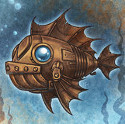|
change my name posted:This is what I'm dreading about the one-shot I'm starting up this weekend. My GF really like Critical Role and this will be her first game, but when I tried to give her suggestions on making her character she didn't want to make them "too strong" because it doesn't fit for "roleplay reasons." e: lol of course my effort post ended the last page and this lovely post was the topper Splicer fucked around with this message at 18:54 on Jan 15, 2021 |
|
|
|

|
| # ? Jun 5, 2024 20:52 |
|
Splicer posted:failure is always bad Yeah I watched some videos kinda addressing this, and a solution offered was to fail forward (depending, of course). If someone fails a stealth check, instead of being immediately found out, the DM says something like: "as you try to sneak through the forest around the goblins, you foot steps on an unseen twig, snapping it. One of the goblins hears and is now coming closer to investigate." It's a great solution because it ratchets up the tension and the drama, let's the players react to a new situation, and is fun to observe even if you're not actively playing. I mean, you could even do an ad-hoc skill challenge just for that person, and having snapped the twig puts them at a -1, down to -3 (discovery). Getting back to 0 puts them neutral but doesn't let them off the hook or something. Iono, just pulling that out of my rear end.
|
|
|
|
MrSargent posted:I have a question that doesn't involve player-created logs. You could allow the other players to use those rolls as well! Then you can more easily scale your challenges.
|
|
|
|
PeterWeller posted:Is it? Can't players inventing stuff be an expression of immersion? They're so engrossed by the experience that they are imagining details in addition to those presented by the DM. Isn't that immersion? The "immersion" that's meant is the player being able to have the same mindset as their character - or, rather, the mindset that we think they have when we see them. So, if you can make stuff up in the world, you lose that immersion because you have to restrain yourself and think about the plot and storytelling concerns - whereas if your character could do it they could just magic themselves up piles of gold, just like you probably would if you gained that power. I put the caveat of "the mindset that we think they have" on it because Hit Points are otherwise a classic objection to this; your character is completely unimpeded until they run out of Hit Points, and always know how much damage they can take until they die, while in the character's head they would be perfectly aware of the fact they are wounded and be terrified they might die at any time. So this isn't really getting into the character's head; it's getting into what we project as being in their head when a classic fantasy hero decides to fight on in spite of having been seriously injured, but that's enough.
|
|
|
|
On the topic of making Skill Challenges interesting - there is a decent post on DnDBeyond that explains how to make travel skill challenges interesting. It's far from perfect, and while I've tried to use it for travel, it wasn't the most exciting. YMMV I've found that the best skill challenges are high-stakes and have clear options. The perennial example of a chase scene through a city is great because it has both of these things: the stakes are high (your stuff will be stolen by the thief if you don't catch up) and the options are clear (you know what a city looks like, what crowded streets might contain). This lets people flex their improv muscle by providing some constraints that keep everyone feeling like the scene is a shared fiction. I've run a similar skill challenge with players having to find their way through a dark and rainy lightning storm atop a craggy mountain. As long as those two factors are present, you'll have a successful challenge. The ones I've seen fail are like the one described in this thread, where a skill challenge is so open-ended that it feels like a waste, or challenges that are so simple that they should have just been a group check or similar.
|
|
|
|
hyphz posted:The "immersion" that's meant is the player being able to have the same mindset as their character - or, rather, the mindset that we think they have when we see them. I don't quite agree - an aspect of immersion is 'what would my character know and expect about the world they live in and have grown up in.' In that context, inventing details or obstacles doesn't endanger immersion, because these are things that would naturally come to mind and would therefore half-exist for them in their experience. Consider, for example, if I'm playing a character in New York City (or closest store brand equivalent) and I say "I'm going to hail a cab, jump in, and tell them to follow that car - what should I roll?" - I have in some sense imagined a car into existence with a driver. But the assumption of 'there's totally going to be a cab that I can jump into' is one that the character would have, and act on, even if it turns out they can't make that work. Nobody would just assume piles of gold exist all around them waiting to be found, and a character expecting or acting on that, or even introducing that detail as an extension of their expectations wouldn't make sense. If a player says, "My barbarian goes looking for the dragon's piles of gold, having slain the beast" that's a situation where the player could reasonably interpret the world through immersion into having big piles of gold coins, rather than, perhaps, a chest the GM imagined at first. There are situations where imagining Scrooge McDuck piles into existence is entirely immersive! And I would argue the log is an example of this: They knew there were going to be difficulties on the path OOC, they knew what kinds of difficulties they expected and how their character would handle them, and at no point did they necessarily have to engage with narrative structure. The GM's role then would be to say, if for some reason a log on the path would be a serious issue for the game, 'maybe not a log... but you do run into overgrown vines' or whatever.
|
|
|
|
We weren't told there'd be difficulties on the path. Just a "get to point B from point A, tell me how you use your skills to get there." If the DM had said something like "on the way you have 3 encounters or problems, and use your skills to overcome them. Describe to me what they are and how you overcame them.", that would have been sufficiently satisfying I think. Or at least the player-creation of problems and solutions would be ok. Maybe if he asked player 1 "give me a problem on the path" followed by prompting player 2 "how would you solve it?" it'd be less...bothersome to me, I guess. So much of this is personal opinion. It's such a minor nitpick I know, and not everyone here will find it interesting enough to talk about, but the devil is in the details I feel.
|
|
|
|
Joe Slowboat posted:I don't quite agree - an aspect of immersion is 'what would my character know and expect about the world they live in and have grown up in.' In that context, inventing details or obstacles doesn't endanger immersion, because these are things that would naturally come to mind and would therefore half-exist for them in their experience. The "I move a log" equivalent would be "There's gridlock in midtown, I roll Insight to avoid it". If the GM thinks it's unlikely there'd be gridlock then they can say so and work with the player to come up with an alternative. "It's midnight on a Wednesday, there's no gridlock anywhere. There might be roadworks though, roll insight to avoid losing time due to a detour".
|
|
|
|
Why would a person make a skill roll if there wasn't a problem in between point A and B
|
|
|
|
After playing for years, I've finally decided to DM for complete newbies. I went with Waterdeep Dragon Heist, since I've played it before and it's supposed to be good for new players and DMs. In order to keep them interested, I've utilized my 3d printer and epson surecolor to make swag, including custom designed mini boxes and action cards. I'm screensharing Fantasy Grounds Unity via Discord, basically driving everything and they tell me what they want to do. (I didn't want the dual steep learning curves to turn them off). I've only ever played Dungeons & Dragons online, first in mote with 4e and then Fantasy Grounds. I really appreciate having the maths all worked out in the background, although I'm glad I gave myself an excuse to make some physical items. If we can ever play in person, I will probably try to set up a screen or projector so I can use the maps and line of sight.
|
|
|
|
Those physical tokens look awesome, I can see why you'd want to play with them.
|
|
|
|
What's the best route for making an (half) orc artificer work
|
|
|
|
Perry Mason Jar posted:If you're reading a good book you may imagine the finer features of a character that wasn't deeply described. If you put a whole different character into the book then you're doing something else - you're co-writing, you're writing fan fiction, etc. Totally fine but you're no longer immersed in the book in the sense that you're getting lost in the narrative of the book. There's a whole philosophical position held by many theorists and scholars (like Barthes and Fish) that regards reading as an act of co-writing. But regardless, I'd say this is another example of someone becoming so deeply immersed in the narrative world that they're actively imagining its existence beyond the discourse they're engaged with. hyphz posted:The "immersion" that's meant is the player being able to have the same mindset as their character - or, rather, the mindset that we think they have when we see them. Yeah, I get what is meant by "immersion" when talking about games. It means you're imaginatively experiencing the game world from the perspective of your character instead of the perspective of some nerd sitting around a table or in front of a screen. I'm rejecting the idea that inventing details that weren't explicitly placed by the DM breaks that immersion. I'm arguing that it instead is an expression of immersion because it's showing imaginative engagement with the world from the perspective of the character. Take the log example that spurred this discussion. I don't think the player in question broke out of her character's mindset when she invented the log. I instead think she was actively engaged with the world from the mindset and perspective of her character. She's playing a strong character who solves problems with athletics, and the DM has implied there will be unspecified problems along this journey, so she imagines her character seeing a problem that she can solve with athletics. Trivia posted:We weren't told there'd be difficulties on the path. You were told so implicitly by the DM making the journey down that path into a skill challenge.
|
|
|
|
Trivia posted:We weren't told there'd be difficulties on the path. Just a "get to point B from point A, tell me how you use your skills to get there." If the DM had said something like "on the way you have 3 encounters or problems, and use your skills to overcome them. Describe to me what they are and how you overcame them.", that would have been sufficiently satisfying I think. Or at least the player-creation of problems and solutions would be ok. Maybe if he asked player 1 "give me a problem on the path" followed by prompting player 2 "how would you solve it?" it'd be less...bothersome to me, I guess. So much of this is personal opinion. Is it possible what's actually bothering you is that the problem and solution she came up with was such a nonevent? "There's a log on the path" is pretty boring and doesn't really go anywhere. If that's part of the issue there's two directions you can go with adjusting it. You can ask them to embellish more, to make "there's a log on the path" something actually interesting, or you can ask them to embellish less, with just "I clear any obstacles we encounter". Going with the latter is teaching the player to be less imaginative, which is bad in a game which is all about imagination. The 13th Age approach where player A invents the problem and player B has to solve it may lead to more imaginative problems and solutions since the problem inventor doesn't have the solution in mind when they create it. Splicer fucked around with this message at 20:38 on Jan 15, 2021 |
|
|
|
Nissin Cup Nudist posted:What's the best route for making an (half) orc artificer work
|
|
|
|
PeterWeller posted:Yeah, I get what is meant by "immersion" when talking about games. It means you're imaginatively experiencing the game world from the perspective of your character instead of the perspective of some nerd sitting around a table or in front of a screen. I'm rejecting the idea that inventing details that weren't explicitly placed by the DM breaks that immersion. I'm arguing that it instead is an expression of immersion because it's showing imaginative engagement with the world from the perspective of the character. But she does that imagination from the point of view of an author or arbiter of the story. Which is perfectly reasonable, but does mean that she's stepping out of her character's mindset. The implicit question is "Player, what obstacle do you want your character to encounter on their journey?", to be decided based on authorial matters. That can include connection with the world, but necessarily includes other things as well, and gives the player extra responsibilities. That's not necessarily bad, in fact it can make the game more involving, but it does also add some restrictions to the player's mindset. If the question was "Ranger, what obstacle do you want to encounter on your journey?" the answer would likely be quite different, once you got over the question of how it's even being asked of the character.
|
|
|
|
hyphz posted:But she does that imagination from the point of view of an author or arbiter of the story. Which is perfectly reasonable, but does mean that she's stepping out of her character's mindset. That's the idea I'm pushing back against. This gets taken as a given, but I don't think it is. I'm saying the player is not taking the perspective of an author. She is instead taking the perspective of her character, imagining what challenges that character sees before her, and articulating those challenges. She's not authoring; she's doing improv. quote:The implicit question is "Player, what obstacle do you want your character to encounter on their journey?", to be decided based on authorial matters. That can include connection with the world, but necessarily includes other things as well, and gives the player extra responsibilities. That's not necessarily bad, in fact it can make the game more involving, but it does also add some restrictions to the player's mindset. I think you're conflating what's happening in a situation like this with the sort of collaborative world and adventure building that takes place outside of the game when you frame the implicit question as "what obstacle do you want your character to encounter on their journey?" That question is one of preliminary thinking, asking the player to consider what they would like their character to experience as part of the game. The situation we're talking about is much more in the moment, and I would say the implicit question here is, "player, what does your character see on the journey?" This question prompts the player to imagine her character's perspective. I don't think this gives the player any extra or special responsibilities or limits her mindset. I think it invites the player to engage with her character in the world and prompts her to open her mindset to that of her character. E: I may be coming across more combative than I mean to here. My issue is with the idea that this sort of gameplay objectively hinders or reduces immersion. If you wanna tell me that this sort of gameplay reduces your immersion, I wouldn't presume to tell you that you're wrong. But does it reduce every player's immersion? Not in my experience. Did inventing a log hamper that player's immersion? I don't think so. Like I said, I see that as an expression of her immersion in her character's perspective. PeterWeller fucked around with this message at 22:25 on Jan 15, 2021 |
|
|
|
PeterWeller posted:That's the idea I'm pushing back against. This gets taken as a given, but I don't think it is. I'm saying the player is not taking the perspective of an author. She is instead taking the perspective of her character, imagining what challenges that character sees before her, and articulating those challenges. She's not authoring; she's doing improv. Exactly. The very notion that this type of participation falls outside the purview of the person playing a character is stifling the type of experience that the skill challenge is attempting to produce.
|
|
|
|
hyphz posted:The "immersion" that's meant is the player being able to have the same mindset as their character - or, rather, the mindset that we think they have when we see them. I donít think immersion is compromised by having PC input. In fact, I think quite the opposite as, even though youríe supposed to put yourself into the mindset of your character, D&D is still a cooperative experience and those extra details and player agency can enhance their investment. I know D&D 5e isnít the optimal system for a more cooperative storytelling atmosphere but it doesnít necessarily preclude it either. At the same time, I donít think anyone is saying that players should have complete agency to determine the world around them so much as having that additional player input can lead to more unique experiences that flesh out the world.
|
|
|
|
change my name posted:This is what I'm dreading about the one-shot I'm starting up this weekend. My GF really like Critical Role and this will be her first game, but when I tried to give her suggestions on making her character she didn't want to make them "too strong" because it doesn't fit for "roleplay reasons." If she wants to play a character that's in her head that's awesome. If she doesn't want a good character because she thinks optimized or good characters automatically are bad for roleplay, she got bad advice somewhere.
|
|
|
|
On the immersion side, I'd find it much more immersion breaking if people insisted on playing mother may I on every little thing. "Is there a table in the room?" "Yes" "Is it big enough to hide behind?" "Yes" "Is it light enough to flip?" "Yes" "is it thick enough to be good cover?" "Yes" "Am I near enough to get to it?" "Yes" "I flip the table and hide behind it" vs "I flip the nearest table with decent cover and dive behind it"
|
|
|
|
Splicer posted:On the immersion side, I'd find it much more immersion breaking if people insisted on playing mother may I on every little thing. "Is there a table in the room?" "Yes" "Is it big enough to hide behind?" "Yes" "Is it light enough to flip?" "Yes" "is it thick enough to be good cover?" "Yes" "Am I near enough to get to it?" "Yes" "I flip the table and hide behind it" vs "I flip the nearest table with decent cover and dive behind it" This also plays into assumed competency which can be a real problem for new players and DMs. Basically, it's better to assume that characters are competent experts who have full access to their faculties and senses all the time, and not marionettes controlled entirely by the players with only the information the players have to go on. The latter leads to a lot of DM Gotcha behavior that was en vogue in like the 80s which, frankly, sucks. That way lies "lol you forgot to say your character is breathing." So like if your player says "I'll flip a table and hide behind it for cover" and the DM responds "you flip one of this inn's pointlessly flimsy cardboard tables, wasting your own time" the DM is assuming that your character and by extension most characters are gormless dopes bumbling around. Which is a playstyle, but maybe not one you'd want.
|
|
|
|
change my name posted:This is what I'm dreading about the one-shot I'm starting up this weekend. My GF really like Critical Role and this will be her first game, but when I tried to give her suggestions on making her character she didn't want to make them "too strong" because it doesn't fit for "roleplay reasons." Let her know that DnD is a game about being competent adventurers in a fantasy world. There are great games out there where you receive benefits for your negatives but DnD isn't one of them. You don't need to make a hyper-optimised character every time but the assumption is that when you play a melee Fighter you're making sure you put your high stats into Strength and Constitution and whatnot. If someone does not actually enjoy tactical resource management and combat, they should not actually be playing DnD. Otherwise you're literally doing the equivalent of suffering through XCOM because you like imagining the personalities of your recruits but have no interest in shooting aliens.
|
|
|
|
Trivia posted:Dude, I wrote it in that way so as not to get lost in the conversation. If I just Okay firstly if you're trying to respond to someone, do not quote them line by line, you need to at a minimum quote paragraph by paragraph or else you lose the context of a what a person is saying and it makes it really easy to pretend what their saying is a nonsensical strawman. A good example is when you cut "At any point a player can stand up and say 'no that doesn't happen to me' and there is not a single thing a GM can do to countermand that. " and "The fiction and story and therefore the game and play itself is a collaborative experience by its very nature and it only functions by shared input and shared agreement." and "It is some really loving lovely browbeating Gygaxian pants shittery that tricks people into thinking that everyone contributing to the story is a bad thing or somehow an incorrect play experience." You cut those three sentences apart which all roll into eachother to explain a concept and it's context. That a ttrpg is a shared experience that everyone needs to give consent to, that the fiction and story inside of that is a shared agreement, and that its a lovely gygaxian-est attitude to try to say otherwise. What I was specifically referring to was not 'you' as a Gygaxian but what you were expressing was. Gygax was this very lovely libertarian that believe that in a ttrpg everything needs to have its clearly preconceived space and existence pre-determined by the GM (though when famously pushed on his stuff not actually thinking any bigger picture would get salty real quick, such as the mcdonalds in a dungeon thing). That players were much more there to operate only in the confided space that the GM would open for them, playing pretty lowkey lackeys where were mostly incompetent and the relationship was famously adversarial between player and GM. It was born out of wargaming and had a general hostility to having the fiction and game be more of a collaborative experience. You were using a lot of language that is typical of that game play style with 'verisimilitude' being a bludgeon to justify something that you personal don't like hidden behind something that sounds like academic language. A word that is really difficult to use in any subjective context as one person's can be in complete opposite to another's. I need to emphasize something here, at no point has anyone really criticized you for saying that you don't like that narrative improv and creation, for a lot of people it's not their thing. What triggered all of this was that you felt it was wrong for another player to create a log falling in the path, when that kind of gentle dip into creativity is actually what some people love most about ttrpgs. There is no mechanical method of adding detail to a scene or story in D&D so as a results it's really good for many players to be given opportunities to do so. The sun example keeps coming up because I think its a good example of the dissonance between what people are saying to you and what you're seeing from your perspective. Now forgive me if I missed it because it went a bit over but did your GM specifically you couldn't identify where east is/where the direction is? Do they say why you couldn't? The issue is that identify where the sun is often isn't really a challenge or something in question, it's something that most people could do, especially some adventurers or travelers. To be perfectly clear the 'problem' that you invented was that, a group of adventurers would not be able to intuitively know and work out which direction is east. I was thinking about this but if I was running that Skill Challenge, I honestly think it would have been your skill check I would have had to kick back or ask for more information to justify. Why would you ever need to roll a skill check to locate the sun? What does failing that represent? Since D&D is a prescriptive resolution system (i.e. you describe exactly the situation and what will happen before you roll) you need to work that out first. So I would want to know, hey why can't you just look up in the sky and work out where the sun was or remember where it was when you woke up? Maybe because you're entering a thick forest for a part of the journey and the tree roof is so thick that you're just getting shards of light so you need to work out something else to help you identify the sun. That way we've all provided some more context about the journey we've worked to fill in the details and as a GM I got to arrive at the next destination alongside you which for me and I'm sure many other people, is a big part of the enjoyment of the experience. So I'm a little confused about your statements, you've said you have been playing for only a couple of months and you've had one campaign of play (I'm not sure if you mean like one session or like a short campaign tbh). This is not an attack on you or anything I'll just assume you've only had like one play group feel free to correct me. The reason why I spent so much time talking about everyone having power and consent in a ttrpg is that its important to recognize how easy it is to say no and stop things getting out of hand. You have so many dissenting voices to shut something down but its much hard to have everyone agreeing collectively on something. One thing you usually agree on is for a GM centric game like D&D, you're all agreeing that the GM gets to adjudicate the outcome of events on behalf of the group so things don't bog stuff down and the game part of the play experience can keep rolling mostly. It's why your default response to any kind of improv practice is to say 'yes and...' to help people build upon stuff. Take affirmative actions (I'm going to use the the curtains thing cause its dumbest example so far and i love dumb things), say 'I'm going to hide in the curtains' because that keeps play momentum going. If you're in a cave and they say that it's really easy to go 'hmm theres no curtains here' or even better if you're a more experienced GM and the group is comfortable with improv, turn the 'yes, and' into a 'yes, but' and create a reason for there to be curtains in this unusual place and have everyone work it out together, maybe the person you're after wants a faÁade of fancy life, they robbed a caravan and theres a bunch of curtains in the box etc. What you describe as a 'knifes edge' is something that is happening in a group of hopefully friendly people if not friends that are excited to be part of this story and a funny or weird aside is actually really good detail for everyone remembering something. You'll also realize its good for the GM to hear what people are thinking because you'll get a good feeling for the room as to what tone they think the current scene is in based on what their default improv goes to.
|
|
|
|
PeterWeller posted:E: I may be coming across more combative than I mean to here. My issue is with the idea that this sort of gameplay objectively hinders or reduces immersion. If you wanna tell me that this sort of gameplay reduces your immersion, I wouldn't presume to tell you that you're wrong. But does it reduce every player's immersion? Not in my experience. Did inventing a log hamper that player's immersion? I don't think so. Like I said, I see that as an expression of her immersion in her character's perspective. Sure. I find it to be two different things, and I enjoy both in different moods. There's appeal to exploring something that's already documented and there's appeal to mutual writing. What does wind me up a bit on this thread though is the people who argue that there is no distinction between them - like there's no difference between reading a book and imagining a story, because they're both just fiction.
|
|
|
|
Dungeons & Dragons Thread: Friday Essay edition.
|
|
|
|
Bobby Deluxe posted:1) Calm down and take whatever weird specific grievance you have off the table. There's no strength checks here, you don't need to rage. lmao, im not raging mate, I'm Australian. I straight up said I was more depressed by this topic than anything. You seem to be missing literally everything I said so I'll try and be more clear. Im not upset at the word you used (I used it myself in that same post!) but your implication of the kind of toxic relationship you have. I'm going to quote something from the 4e DMG that I really like as a description of what a GM does: quote:What Does the DM Do?: The Dungeon Master has many hats to wear in the course of a game session. The DM is the rules moderator, the narrator, a player of many different characters, and the primary creator of the gameís world, the campaign, and the adventure. The most important point here is that the GM is the primary creator in D&D but importantly not the only creator, that's pretty vital to keep in mind. All players have a role in creating the game's world, the campaign and adventure. The GM is not some like weird subservient thing, they want to engage with players for the most part. Now its clear you personally want to have a story told to you and you want a problem present to you for you to solve. Thats okay, there is nothing inherently wrong with that but you're presenting the idea that anyone else who wants something different than that is wrong. You even try and denigrate a GM as lazy, creating fictional scenarios where they've gone off to check their phones while the game is happening because you think so little of people who enjoy this type of gameplay. A GM is a person you should probably have a friendly relationship with that you want to be accommodating with and work with just like anyone else in this share group activity. There are many reason an open improv skill challenge might happen to be honest. It might be a chance for the GM to give certain players who really like the creativity part of the game a place to express themselves and have fun just in the same way a player who really like character builds gets to flex that muscle in combat. It might be a chance for the GM to experience a bit of a story told to them, so they can be surprised and bounce ideas off the group as part of a play activity, be it simply for a quick fire and forget or as a way to get some inspiration for future problems. It might just be a easy way to get a feel for the tone of the game based on what the players are defaulting to as part of their improv. Theres nothing badwrongfun with that and it's something that only lasts a few minutes so people like yourself that really hate that part of the game you're playing dont have to wait to long. Bobby Deluxe posted:To extend the metaphor, imagine if you turned up to a game and the DM just sat back and said, start of session 1 'Ok how do you get to the boss?' And then got you all to roll for the villages you pass through, the fights you have, random loot on the bodies etc. That's not why we play D&D. We play it to be told a story by the DM. We collaborate by playing the role of characters in that story. The DM facilitates that by describing the world and the problems. I know this wasn't addressed at me but lol. kingcom fucked around with this message at 02:21 on Jan 16, 2021 |
|
|
|
change my name posted:This is what I'm dreading about the one-shot I'm starting up this weekend. My GF really like Critical Role and this will be her first game, but when I tried to give her suggestions on making her character she didn't want to make them "too strong" because it doesn't fit for "roleplay reasons." Depending on the game group shes with and what class she's playing it should be fine, it's a one shot so who cares. Perhaps encourage her that its a disposable character so feel free to be a character with lots of agency, which in dnd terms means they are strong mechanically. Perhaps ask what are the roleplay reasons she has for them not being very strong? I've met people like that and it can be a difficult thing to explain that in D&D there aren't really roleplaying mechanics and as a result the strength of the character is pretty independent of your roleplay particular as 5e penalizes you forever. I'm not sure familiar with critical role but I watch a couple of episodes and it seemed like all those characters were pretty optimized? At least in the sense of 'classes most important stats are high, other ones are whatever'. The strength of a character determines both how much agency you have as a character as well as how much of a burden you could potentially be to the group. The classic 'useless' character who can't do their core job class can be something that is really frustrating to deal with for the rest of the group so its something to also consider but really thats only important for a longer term campaign.
|
|
|
|
Declan MacManus posted:any tips for running games at a high level? my dm is getting burnt out because he canít come up with challenging encounters for a party of 6 level 20 characters (but really i think he just wants to wrap up the story and be done with this campaign heís been running for three years; i just was hoping to come up with stuff to make it fun for him) (ignoring what appears to be two people fighting to the death over a game about rolling dice and pretending to be wizards) high level fights need to just go loving sicko mode and be absolute bullshit on every level because the players have ascended to the level of breaking the game and the only way you can fight back is by also breaking the game. this is not to everyones taste, but it can make for some exciting final battles. multiple boss transitions, bosses that add mobs throughout, battlemaps that change dramatically(like the boss just breaks the ground and sends everyone hurtling into hell or something), just throw all caution to the wind. with 6 players at level 20, there is literally no way to balance the game anymore, so just go pure spectacle only. and yes, you probably have to homebrew some broken rear end monsters.
|
|
|
|
change my name posted:This is what I'm dreading about the one-shot I'm starting up this weekend. My GF really like Critical Role and this will be her first game, but when I tried to give her suggestions on making her character she didn't want to make them "too strong" because it doesn't fit for "roleplay reasons." One of the things about D&D that I generally regard as bad but sometimes works out well in a stopped clock kind of way is this: The mechanics don't give a single gently caress about the fiction. This isn't a fiction first game. Almost none of the mechanics require specific roleplay/fiction in order to function. So you can have 18 STR (or roll it) and then choose to describe (or randomly roll) a human who's 4'10" 110lbs, or an 18 INT wizard who memorises spells and gets the good plusses but is otherwise a ditzy goldfish-memory'd flake, without the mechanics demanding that you be a worse warrior or wizard for wanting to roleplay those traits.
|
|
|
|
pog boyfriend posted:(ignoring what appears to be two people fighting to the death over a game about rolling dice and pretending to be wizards) high level fights need to just go loving sicko mode and be absolute bullshit on every level because the players have ascended to the level of breaking the game and the only way you can fight back is by also breaking the game. this is not to everyones taste, but it can make for some exciting final battles. multiple boss transitions, bosses that add mobs throughout, battlemaps that change dramatically(like the boss just breaks the ground and sends everyone hurtling into hell or something), just throw all caution to the wind. with 6 players at level 20, there is literally no way to balance the game anymore, so just go pure spectacle only. and yes, you probably have to homebrew some broken rear end monsters. Seconding that the base game high level monsters are dull and dont feel special at all so absolutely add some bigger homebrew stuff to it. To build up on this in terms of larger story stuff, it's really helpful to start looking at high concept adventures as the structure your working in. You're not just going to defeat a conspiracy or defeat a dragon king who is conquering the world. You are needing to learn the secret death punch technique, the only thing that could possibly kill a dragon of that power but unfortunately the only monk who ever mastered this skill achieved a higher state of consciousness and their own mind is a pocket dimension that the party needs to inception into to find the monk and either convince the monk to awaken or learn how the monk developed the technique in the first place. Big crazy stuff like that should be the kinds issues your party is handling at that point on a regular basis, it makes it easier to develop very thematic encounters along the way. Ultimately theres a reason D&D adventures fizzle out because it becomes really exhausting to build encounters that are engaging at high level like that.
|
|
|
|
kingcom posted:Seconding that the base game high level monsters are dull and dont feel special at all so absolutely add some bigger homebrew stuff to it. the thing is i love that kind of thing, the framework of dnd has a lot of ability to make really cool fights. use lair actions to ask open questions in the fight, split the party to do dps races, make encounters where there are multiple goals and everyone has to decide how they can best deal with the many problems you throw at them. i love building those kinds of encounters. but not every dm is going to be able to do that, and players get bogged down by the amount of options they have. it is not for everyone. but if anyone wants to talk about encounter design i am always in. also, to add to your second point, that is how you take dnd games to the next level. the best dms are the ones that are excited by their player characters. learning to love what your players put down on their character sheet and get hype and start making content that makes those players have amazing character moments is the best part of playing this game. you have a fighter who started the game with his fathers sword, then later got all this magic gear and replaced it. but end game? that fighter needs to enchant the ultimate weapon to beat the dragon... so have a quest to enchant that fighters sword from 70 sessions ago and turn it into a legendary magic item. i guarantee you if you run a megacampaign and do things like that your tables will love it.
|
|
|
|
pog boyfriend posted:the thing is i love that kind of thing, the framework of dnd has a lot of ability to make really cool fights. use lair actions to ask open questions in the fight, split the party to do dps races, make encounters where there are multiple goals and everyone has to decide how they can best deal with the many problems you throw at them. i love building those kinds of encounters. but not every dm is going to be able to do that, and players get bogged down by the amount of options they have. it is not for everyone. but if anyone wants to talk about encounter design i am always in. Yeah exactly, building an actual interesting encounter is genuinely exhausting and time consuming at higher level and I completely understand a GM quitting that. It's why I'm really glad I implemented milestone resting so I could focus on big set piece encounters and dump most of the trash mob fights that you tend to need to add. It's why I'm always disappointed at how a lot of the big creatures and how dull a lot of the lair mechanics are. Theres genuinely a lot of space to with actual changing environments and set pieces as a result of them. I had the players fighting a banshee at one point that was spewing forth a wave of ice that was cross out across the battlefield that should expand in different ways on every time the lair action happened. Another great tip to make about high level dnd is that killing a character is incredibly trivial to recover from by then so you can combine a great technique of openly telegraphing when a huge right hook is going to happen, when it will happen, that its going to be a huge effect and then let the players choose to make a decision based on that provided information. The players were level 5 with the banshee fight and that wall of ice was immobilizing anyone it touched and if they stayed in it they would become petrified but because they knew exactly how far the ice crept forward and how it moved they had lots of decisions to keep moving around it or pin enemies into it. pog boyfriend posted:also, to add to your second point, that is how you take dnd games to the next level. the best dms are the ones that are excited by their player characters. learning to love what your players put down on their character sheet and get hype and start making content that makes those players have amazing character moments is the best part of playing this game. you have a fighter who started the game with his fathers sword, then later got all this magic gear and replaced it. but end game? that fighter needs to enchant the ultimate weapon to beat the dragon... so have a quest to enchant that fighters sword from 70 sessions ago and turn it into a legendary magic item. i guarantee you if you run a megacampaign and do things like that your tables will love it. Yeah 100% agreed, take that players world building and make that the plot the key to saving the day and it will create an amazing sense of empowerment.
|
|
|
|
Elector_Nerdlingen posted:One of the things about D&D that I generally regard as bad but sometimes works out well in a stopped clock kind of way is this:
|
|
|
|
Collaborative storytelling is great, and skill challenges are a form of collaborative storytelling, but I think the bad feelings this one generated is more because a skill challenge probably wasn't the right kind of collaborative storytelling to use there. I think skill challenges work best when the group has a unique, complex problem they need to solve, where there is a concrete and tangible benefit to success. When a problem is vague, generic, uninteresting or simple, and the successful outcome is "nothing of consequence happens", you'll end up with a skill challenge which feels unengaging. If as a group you want to inject some level of collaborative storytelling into a generic trip from A to B, a collaborative storytelling prompt like "describe some problems you encountered along your travels, and how you solved them" is probably a better choice than "let's do a skill challenge". Generally when skill challenges appeared in 4e, the designers usually had some very concrete ideas of how that challenge might be overcome, and when done well, those ideas were expressed to the players somehow, either explicitly or descriptively. The creative element then was that players could imagine other sub-problems related to the challenge, and use their skills in novel ways to overcome those, instead. But at its core a skill challenge is a tool of abstraction, it's for situations where there's so many tasks that need doing to ensure success that the players can't possibly do them all (even if the characters do), and so when one player describes a sub-problem they're going to tackle, everyone's naturally inclined to lean into it, because nobody has the entire problem mapped out in their head. "Your wagon has been destroyed by bandits" is a good prompt for a skill challenge because the list of things you could imagine you'd need to do to get that wagon fixed is probably a mile long. "You are travelling along a major road, following directions from point A to point B", not so much, and the players now need to scrabble about trying to work out how they'd be useful. My suspicion is that if the skill challenge had been interesting and engaging, then the notion that the players were just making up problems to solve themselves would not have even occurred to anyone at that table. Reveilled fucked around with this message at 17:08 on Jan 16, 2021 |
|
|
|
just a general dm protip: donít spring creativity on your players when they arenít expecting it if you want them to collaborate as far as scene setting and storytelling goes, ask them if theyíre comfortable trying it. pcs are like horses, they spook easy
|
|
|
|
Elector_Nerdlingen posted:One of the things about D&D that I generally regard as bad but sometimes works out well in a stopped clock kind of way is this: Honestly I wish more people understood this aspect of the game better. Like, in one of the games I'm in I'm playing as an Alchemist (3rd party class) with high INT, but I roleplay her as being kind of a weird ditz who always comes to the weirdest/stupidest possible conclusions about the world around her and doesn't pick up on very obvious details about the situation she's in. She has high INT because that's the "Be good at Alchemy" stat, and being good at alchemy is the important part of her character, how her INT score interacts with any other area within the game is immaterial to me.
|
|
|
|
Declan MacManus posted:just a general dm protip: donít spring creativity on your players when they arenít expecting it  I dropped the very simple task of creating an NPC together, determining how the party knew them, and inventing a memory each character had with the NPC (this is from the beginning of the "Cellar of Death" TOA module) and it almost broke my party's brains
|
|
|
|
KingKalamari posted:Honestly I wish more people understood this aspect of the game better. Like, in one of the games I'm in I'm playing as an Alchemist (3rd party class) with high INT, but I roleplay her as being kind of a weird ditz who always comes to the weirdest/stupidest possible conclusions about the world around her and doesn't pick up on very obvious details about the situation she's in. She has high INT because that's the "Be good at Alchemy" stat, and being good at alchemy is the important part of her character, how her INT score interacts with any other area within the game is immaterial to me. Do you have a link to your alchemist? because the Tasha's version is very un alchemist like. I homebrewed my own for the next campaign that I'm about to play as a PC for the first time and the DM and I have been trying to figure out what's considered OP. I think we both just resolved to keep an eye on it throughout the game and adjust as necessary.
|
|
|
|

|
| # ? Jun 5, 2024 20:52 |
|
I think importing sklli challenges to 5e is fine but I also agree that it could do better if it was more tightly integrated. I would codify it so that there is less ambiguity for what the players are doing by creating a deck of obstacles and then give players a certain amount of time to deal with that thing. I'd go so far as to use index cards to put the obstacles physically on the table (or virtual table) and then ask players to debate and determine what skills they could use. They can't overlap so they must work together. After they decide how they are going to divide the labor they write down on the obstacles what they're doing. Then comes the camera swinging fiction. Do the characters triumph or get massive setbacks? Is it all happening simultaneously or in a linear fashion? What is the final outcome after all the rolls have been reckoned? This way you have a clear framework as mentioned previously of showing the challenges and giving players latitude to debate and think about their character skill usage relative to the challenges put forth in the game world by the DM. This need not be particularly exhaustive and can use abstract imagery or words or both to represent the challenge from the DM side. For inspiration on this I would recommend looking at Index Card RPG for image assets as well as Codenames for random word collections, or possibly Dixit. I fundamentally disagree that you can just take something from another system and then expect it to work flawlessly for every table, and even then you will want to create play aids to help people wholly unfamiliar with the mechanics. I can write this up as a flow chart a little later since I'm posting this whilst on the can
|
|
|



































